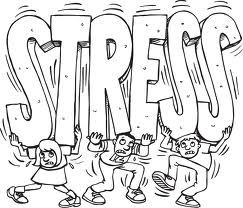
The stress stats are screaming at us. They may even be adding stress for some, but they—like stress—are very real.
1.) 80 percent of doctor visits are stress-related.
2.) More than half of all deaths result from stressful lifestyles. —U.S. Centers for Disease Control and Prevention
3.) Over 30 percent of U.S. adults experience enough daily stress to impact their performance at home or work. —National Science Foundation
4.) Annually over $800 million dollars is spent on "anti-anxiety pills." The U.S. accounts for 5 percent of the world's population and consumes 33 percent of the pills. —Neurogen
5.) 77 percent of the U.S. population feels physical symptoms from stress. —American Psychological Association, American Institute of Stress, NY
Every day I hear from clients and friends about how stressed they are and how it’s becoming more chronic by the day, and they feel as if they could explode.
“If I don’t take a break from it all, I might blow a gasket,” a client told me. I invited her to follow her inner compass and take time off alone, shut down her smart devices and relax, reflect and sort out the stressful issues in her life. The client agreed and decided to do a solo retreat. When I emailed her a week later to see how she was doing she said she’d postponed her retreat and stress had gotten worse. Two weeks later I learned that she hadn’t taken a break and had a heart attack. This story brings home the following realities:
- The human body is not designed to deal with prolonged chronic stress.
- Our modern world seems designed to create prolonged and chronic stress.
- Our culture offers very few proactive, healthy tools and methods for dealing with the new levels of stress that affect us daily.
- Most people think of stress as something that comes from outside. They focus on external problems and fail to address and heal the roots of stress within.
- Failing to manage their stress levels, anyone can build up emotions and implode inside; thus anyone can become a walking time bomb.
I use the “walking time bomb” metaphor to illustrate how current levels of stress in our culture, and our lack of effective tools for addressing and healing it is a growing dilemma. We’ve all seen news stories of people who suddenly snap and explode in violence. But far more common are the lesser, often preventable “stress explosions” of recurring headaches, anxiety, obesity, depression, high blood pressure, addictions, heart attacks, strokes, road rage, relationship conflicts, high divorce rates, and more.
Here’s what Dr. Lissa Rankin in her book Mind Over Medicine: Scientific Proof That You Can Heal Yourself says: “As far as your nervous system is concerned, stress is anything that triggers the amygdala in your primordial limbic system to activate the 'fight-or-flight' stress response. And whenever this happens, your body’s natural self-repair mechanisms—the ones that help prevent heart disease, fight cancer, ward off infection, and assist in anti-aging—get flipped off. As far as your body’s health is concerned, thoughts, beliefs, and feelings that trigger the stress response may damage your health more than a poor diet, avoiding exercise, bad habits, and sleep deprivation. But the good news is that the opposite is also true! Because your thoughts, beliefs, and feelings are at least partially under your control, you have the power to switch off your body’s stress responses and return the nervous system to the health-inducing relaxation response that activates the body’s natural self repair”
We all have ways of managing the stress of everyday life. What we don’t always take into account is the impact our coping strategies—both conscious and unconscious—have on the body and the mind. When we train ourselves to redirect our attention to listen to our body, an ever-present resource in times of stress, we activate a higher intelligence and calm the reticular activating system in the brain, which flips our fight or flight mechanism into the “on” position when we perceive a threat. Research has shown that body-based mindfulness affords the man or woman who practices it a refined ability to re-direct fearful, angry thoughts and knee-jerk reactions that are counter-productive. We are then, in turn, spared the negative consequences ordinarily associated with habitual coping mechanisms that tend to blindly sabotage us, diverting vital energy that could be better put to use in achieving our goals or expanding our happiness.
Here’s a body/mind intervention tool to address stress on demand before it accelerates.
- Shift your attention and unplug from external stimuli in stressful situations.
- Observe your breath and scan your body and state—either inwardly or aloud—what you notice.
- Choose some corrective body-based action to counteract what has been observed, for example: relax tensed up shoulders or loosen a tight jaw.
- Visualize a calming wave in the mind’s eye and get centered.
- Focus on the next right-action, priority, or focus that is on track with your desired outcomes. Be present and plan to take one action vs. multi tasking.
In a study done at a medical facility, patients who took these steps while hooked up to diagnostic machine, reduced stress on an average of 55 percent after following these steps.
One More Tip: Empty Your Tank
Our bodies are like storage tanks and when they get too full they need to be emptied or they become overloaded with toxins and stress and get damaged. Using body awareness to check in with your body and empty your tank of stress often creates better health. Body awareness can also save you from many aches and pains caused by unconsciously tensing areas in your body. When someone says, "I am happy I told my boss what I was holding in for months; I got it all off of my chest," they usually feel the heaviness on their chest lighten. When we take responsibility for listening to the bodies we live in, we take the condition of our health in our own hands. When we empty our "tank" of stress that comes from toxic memories, thoughts and beliefs, our body’s natural restorative powers kick in and our health improves. So communicate vs. holding it all in. Take a run instead of sitting stewing all bottled up.
Stress less, enjoy more.




